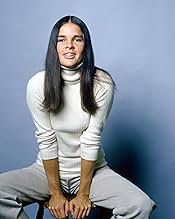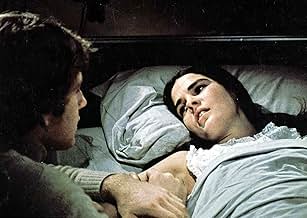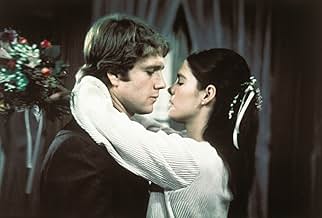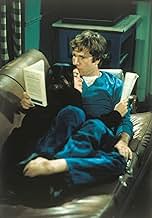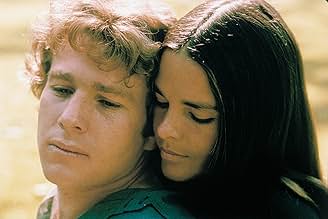Love Story
- 1970
- Tous publics
- 1h 40min
La simple et bouleversante histoire d'amour entre deux étudiants, la fille d'un boulanger rital et le fils d'un banquier WASP. Mozart, Bach, et les Beatles. Rires. Bataille de boules de neig... Tout lireLa simple et bouleversante histoire d'amour entre deux étudiants, la fille d'un boulanger rital et le fils d'un banquier WASP. Mozart, Bach, et les Beatles. Rires. Bataille de boules de neige sur le campus. Et une saloperie de crabe qui s'invite au final. [255]La simple et bouleversante histoire d'amour entre deux étudiants, la fille d'un boulanger rital et le fils d'un banquier WASP. Mozart, Bach, et les Beatles. Rires. Bataille de boules de neige sur le campus. Et une saloperie de crabe qui s'invite au final. [255]
- Réalisation
- Scénario
- Casting principal
- Récompensé par 1 Oscar
- 10 victoires et 17 nominations au total
- Mrs. Barrett
- (as Katherine Balfour)
- Hank - Oliver's Roommate
- (as Tom Lee Jones)
- Cornell Hockey Player
- (non crédité)
Résumé
Avis à la une
The movie has all the ingredients a romantic movie needs, even the most formulaic ones. Two totally different boy and girl from different social levels fall in love with each other and of course not everyone in the environment (mainly the parents of course) are happy with this. Their love life has a couple of ups and downs in which they have to weight some choices for themselves against choices for their love together. Further more the movie also features an unavoidable dramatic twist in which one of the characters get seriously sick (Don't worry, this is not really a spoiler since this is mentioned right in the beginning of the movie already). In other words this movie has all of the formulaic sappy sounding ingredients to make this a sappy formulaic romantic movie. Yet "Love Story" is not. Why? It's hard to put your finger on why "Love Story" is so much more and so much better than your average love story but I guess that you can still answer this question, once you start analyzing the movie. Although the story and all of its elements are sappy and formulaic the movie itself doesn't try to be sappy or dramatic. The movie doesn't attempt to make you cry, by putting in over-the-top dramatic filmed moments with dramatic loud music and all that sort of stuff. Instead the movie chooses to take a realistic approach, no real surprise, considering that this is a '70's movie. The decade in which the most realistic (and best) movies were made. It has as a result that the movie never feels forced or overdone. It even makes the most formulaic and predictable elements of the movie work out, as strange and unbelievable as it might sound. You also have to keep in mind that at the time it was released, this movie was not formulaic at all. It was a fresh approach on the genre and inspired many later movies. In a way "Love Story" was bare raising and set the standards for many later romantic movies. The movie was nominated for 7 Oscar (of which it won 1 in the end) not just for no reason.
The movie is obviously made on a low budget but it makes the end result look all the more creative. It's effectively directed by Arthur Hiller, who later went on directing lame comedies. A real waste of talent. The musical score by Francis Lai is a classic and the simple effective cinematography from Richard C. Kratina makes the movie feel all the more realistic.
The movie made Ali MacGraw and Ryan O'Neal big stars for the moment and they were both even nominated for an Oscar. To be frank I didn't even always liked their characters in the movie and I've never been to fond of Ryan O'Neal as an actor. In that regard I liked the supporting cast way better with John Marley, Ray Milland and Tommy Lee Jones in his very first (and very small) screen appearance. He looked so amazingly young, that he was hard to recognize.
Although the movie takes some formulaic and obvious dramatic turns, the movie still always remain perfectly watchable, just not always emotionally involving enough. So I'm not to sure about it if this is a movie that can (still) make people cry. Nevertheless the movie still has its powerful moments, mostly due to the realism of it all. Everybody should be able to recognize the situations- and put themselves in the place of the characters of the movie. Everybody have been through similar events in their life at one point, in one way or another.
Now days lots of people actually complain about the tag-line and famous quote from the movie; 'Love means never having to say you're sorry'. People find this a stupid and illogical line. To those people I would like to say; Wait until you've truly falling in love once. If you've REALLY been in love, you'll understand what is the meaning of that line. Love is about mutual respect and also accepting each others less pleasantries and still love each other for it. This also means never having to apologies to each other. Actually when I was in love once and the girl felt the same way about me (Yes amazing, I know. It seems like ages ago now), whenever one of us said 'sorry' for something the other always said; 'You never have to apologize for anything to me'. None of us had ever seen the movie or heard of its famous line before, so I think that really says something about the line and the truth that is in it.
It in my opinion certainly is one the best and perhaps most influential romantic movie ever made. A must-see that deserves more objective respect and higher rating on here.
8/10
http://bobafett1138.blogspot.com/
Ali MacGraw brings an undeniable spunk to her characterization here which helps undercut the potential sentimentality of the picture, and lends the finale a greater emotional punch. The natural handsomeness and effortless charm of Ryan O'Neal is used to exceptional effect, and the supporting performances of Ray Milland and John Marley (as two very different types of fathers) are terrific. This is a film that never attempts to disguise it's own thematic manipulations, which may very be why it remains so effective. French composer Francis Lai's haunting original score further enhances the film, which is justifiably considered by many to be one of the all-time tearjerkers.
Le saviez-vous
- AnecdotesThe scenes with Oliver Barrett walking alone through a snowy New York were added after principal photography was completed. The production was almost out of money and did not have the necessary funds for permits to shoot in New York City again - so all the shots were grabbed illegally using a skeleton film crew and Ryan O'Neal.
- GaffesDuring the Harvard-Dartmouth hockey match, Oliver is wearing #7 jersey for Harvard. In the penalty box, he tells Jenny that he is concentrating on how he is going to total the Dartmouth player who had him sent to the box. He points to the Dartmouth player, who at this point has just taken down another Harvard player who is clearly wearing #7.
- Citations
[first lines]
Oliver Barrett IV: What can you say about a twenty-five-year-old girl who died? That she was beautiful and brilliant? That she loved Mozart and Bach, the Beatles, and me?
- Crédits fousUnusually, for a movie released in the early 1970s, there are no opening credits after the title has been shown.
- ConnexionsEdited into The Kid Stays in the Picture (2002)
- Bandes originalesConcerto No. 3 in D Major
Written by Johann Sebastian Bach (as J.S. Bach)
Meilleurs choix
- How long is Love Story?Alimenté par Alexa
- Is 'Love Story' based on a book?
- What is the theme music called and who wrote it?
- What is the poem that Jenny recited to Oliver at their wedding?
Détails
- Date de sortie
- Pays d’origine
- Langue
- Aussi connu sous le nom de
- Historia de amor
- Lieux de tournage
- 119 Oxford Street, Cambridge, Massachusetts, États-Unis(Oliver and Jenny's rented apartment)
- Sociétés de production
- Voir plus de crédits d'entreprise sur IMDbPro
Box-office
- Budget
- 2 200 000 $US (estimé)
- Montant brut aux États-Unis et au Canada
- 106 550 690 $US
- Week-end de sortie aux États-Unis et au Canada
- 87 198 $US
- 9 févr. 2020
- Montant brut mondial
- 106 550 690 $US
Contribuer à cette page








